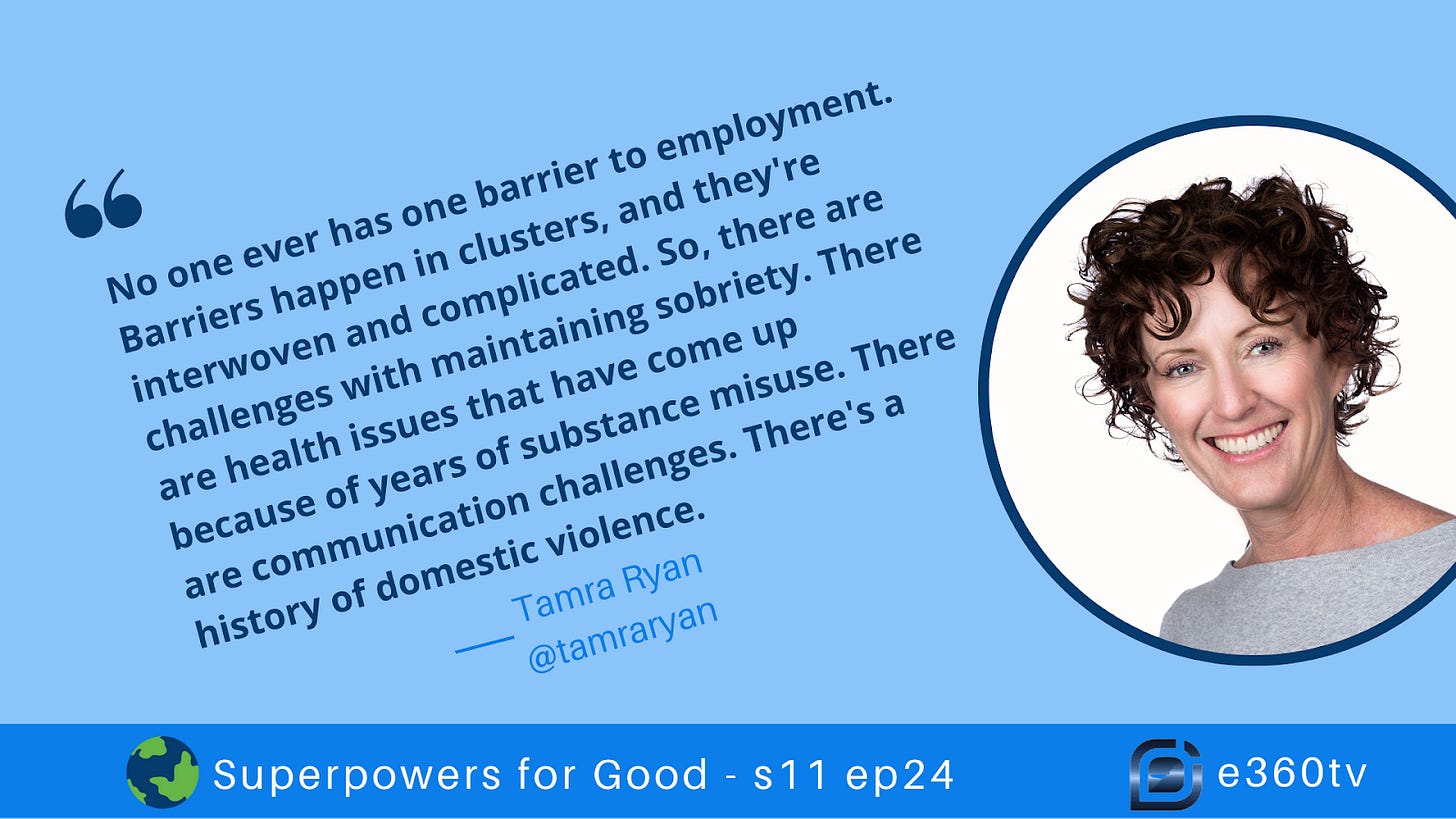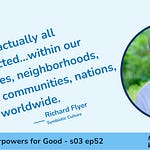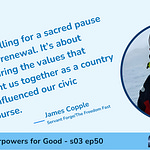Remember, you can watch the Superpowers for Good show on e360tv. To watch the episode, download the #e360tv channel app to your streaming device–Roku, AppleTV or AmazonFireTV–or your mobile device. You can even watch it on the web.
Devin: What do you see as your superpower?
Tamra: My superpower is giving grace.
Tamra Ryan and her team at the Women’s Bean Project, a nonprofit social enterprise in Denver, daily accomplish tasks many of us fear are impossible–helping women recovering from addiction, incarceration or homelessness return to full, productive and happy lives.
The Women’s Bean Project hires women in these challenging circumstances to work and train for even better jobs. “A typical woman we hire hasn't had a job longer than a year in her lifetime,” Tamra says. “The average age is about 38. So by the time they come to the Beam project, they have long histories of addiction and incarceration, often homelessness.”
The nonprofit employs the women to make bean soup–and about 50 other food products they sell locally and online nationally.
She provides some additional context for understanding the work:
No one ever has one barrier to employment. Barriers happen in clusters, and they're interwoven and complicated. So, there are challenges with maintaining sobriety. There are health issues that have come up because of years of substance misuse. There are communication challenges. There's a history of domestic violence.
Think about all of those things in the context of how they get in the way of employment and employment being the key to breaking out of poverty and staying out of prison. We approach it from that standpoint of working with each woman, meeting her where she is and helping her overcome her barriers to employment.
To illustrate the power of the work, Tamra shares a story of a young woman:
One woman stands out to me. She was just 21. That's our minimum age to hire at. Her background was that at 13, her mom introduced her to cocaine and later threw her out of the house because she perceived that she was competition for boyfriends.
So, at roughly 13, she was on the streets. She didn't finish school. She was too young to get a job. So, she spent the next five years involved with a lot of bad people, doing a lot of bad things.
Maybe the best thing that could have happened to her is that at 18, she was arrested because then she got into the justice system; that helped her get stable and get sober.
By the time she was 21 when her pastor referred her to us, she was ready to start her life and to watch her go from not having had the opportunity to develop her identity as a teen, which is when we typically do, to becoming–deciding who she wanted to be and what kind of mom she wanted to be.
Today, she's in her 30s, and she is she has a daughter.
Think about the fact that her daughter will never know a time when [her mom’s] not employed. Not only does she, this woman, have a full-time job, but she also volunteers at a women's prison near her home and does pastoral counseling for the women who are in this prison.
When I think about when we get to a point where we are stable enough to begin to pay it forward or to help someone else, that's a testament to having accomplished a lot.
The program's success proves that troubled women society may be tempted to write off as lost souls are worth a hill of beans–and much more. Their lives have all the potential of anyone else and all the value of any of us.
In this inspiring work, Tamra daily employs her superpower, giving grace.
AI Episode Summary
Tamra Ryan is the CEO of the Women's Bean Project in Denver, which employs women in difficult circumstances through a nonprofit social enterprise.
The Women's Bean Project hires women experiencing chronic unemployment and teaches them the skills needed to move to mainstream employment.
The women work in food manufacturing, producing a variety of food items distributed across the US.
The purpose of the Women's Bean Project is to help women overcome barriers to employment.
Women spend 70% of their paid time working in the business and 30% of their paid time in classes focused on personal development.
The Women's Bean Project works with other organizations to provide additional support, such as housing, legal services, and counseling.
The women in the program typically have histories of addiction, incarceration, and homelessness.
The Women's Bean Project aims to address the whole person and help women become great employees who can then find jobs in the community.
The program has had many success stories, with women blossoming into confident individuals who can support themselves and their families.
By changing a woman's life, the Women's Bean Project also has a positive impact on her family and the community as a whole.
How to Develop Giving Grace As a Superpower
Tamra shares how she uses her superpower, giving grace, to serve the women employed at the Women’s Bean Project:
The person I'm interacting with is coming from a place, and maybe they're doing the best that they can, and maybe it's not a great interaction, but I need to give them the grace to be where they are at that time.
I think very often, especially today, so many of our interactions between people entirely lack grace–just understanding that people bring different perspectives to every interaction with one another–there is not a lot of grace-giving that's happening.
Tamra shared another inspiring story to help us see the impact of grace:
I think of a woman named Joy who came to us after spending time in federal prison because of the level of drug dealing that she was doing. She came to us; she had gotten custody of her kids back. She had four kids ranging in age from 8 to 18 when she started working for us.
During the time that she was working for us, at the time, our wage was $8 an hour. When she went back for her redetermination for her food stamps, which were helping her support her kids, she was receiving $150 a month–and figuring out how to make that work with just 150 bucks–and they cut her to $5 a month because her $8 an hour job was too much.
She came in to work and said, “I just have to quit because this isn't worth it. I don't even know why I don't just go back to dealing drugs because I never had to worry about this problem. I didn't have to report my income.”
It was a dark time for her. She stopped coming to work for a few days. We started working with her. We wouldn't let her go. We persisted. What could have happened with any other employer is to just let her quit. What we decided was that, in the long run, that wouldn't be the best thing for her or her family–allowing her to quit.
Instead, we helped her get access to food resources. She was pretty close to graduating.
I think the ultimate punch in the face to fate was that she went on to work for a food distributor, making $18 an hour, so she no longer even needed access to food stamps. She graduated our program because we wouldn't let her quit. And then she ended up having this sweet revenge on the universe by getting such a great job.
Tamra also shares some advice for giving grace:
Check yourself and realize that your perspective is just one perspective. I often joke that there are three sides to every story: his, hers, and the truth. Starting from that standpoint of understanding that just because it's your opinion and it may be a well-founded opinion or perspective, it's not the only perspective.
Being open to the idea that someone else's perspective is just as valid as your own and being willing to listen to it and try to understand [is key]. It's easy for us to apply our paradigms. I think back to when I first started at the Bean Project, with the biases and prejudices that I had that I didn't even know I had.
I remember thinking that people who were chronically unemployed didn't want to work or that people who went to prison had just made bad choices. It was their fault. It took meeting women and recognizing that, except for the fact that I happen to be born a middle-class white girl in Colorado Springs, there was no difference between us.
A woman may have made bad choices, but maybe she had five choices, and they were all bad. She chose the best of the bad. It was being faced with the reality that other people had that wasn't the same as my reality—beginning to understand that except for the grace of God, go I on some level—being open to the idea that each of our own perspectives is one of many perspectives. Being open to this idea that we may not be right is a great way to start in terms of giving grace.
By following Tamra’s example and advice, you can make giving grace an empowering skill that helps you better serve others. With practice, you can make it a superpower that enables you to do more good in the world.
Guest Profile
Tamra Ryan (she/her):
CEO, Women's Bean Project
About Women's Bean Project: Women's Bean Project provides job training and employment to women facing significant barriers to work, selling high-quality food products made by these women to support their mission.
Website: www.womensbeanproject.com/
Twitter Handle: @womensbean
Company Facebook Page: facebook.com/womensbeanproject
Other URL: www.womensbeanproject.com/subscription/
Biographical Information: Tamra Ryan is the CEO of Women's Bean Project, a social enterprise that provides transitional employment while operating a food manufacturing business to women attempting to break the cycle of chronic unemployment and poverty. Tamra is a former partner and board member for Social Venture Partners-Denver, currently serves as part-time Interim CEO for the Social Enterprise Alliance, and is on the Council of Advisors for the Graduate School of Social Work at the University of Denver. Congressman Mike Coffman (R-CO) recognized Tamra’s servant leadership and entered it into the Congressional Record of the 115th Congress, Second Session in May 2018. She was honored by the Colorado Women’s Chamber of Commerce as one of the Top 25 Most Powerful Women in Colorado and is part of the American Enterprise Institute (AEI) Leadership Network. She was a presenter at TEDxMilehigh and is a highly sought-after speaker for topics such as compassionate leadership and social enterprise. Tamra is the author of The Third Law, a book that highlights the societal obstacles and internal demons that must be overcome for marginalized women to change their lives. The Third Law has won numerous awards for women/minorities in business and social activism.
Twitter Handle: @tamraryan
Linkedin: linkedin.com/in/tamraryan/
















